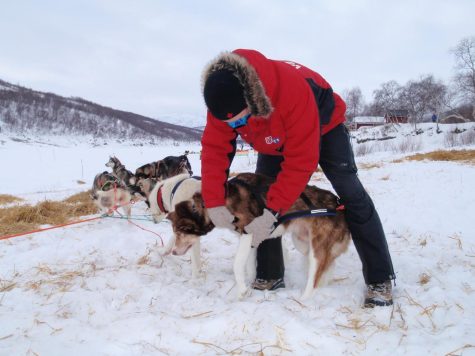
Treatment of Sled Dogs Raises Ethical Questions
March 22, 2023
Along races like the Iditarod, checkpoints are set up along the trail where dogs can eat, rest, and get checked out by veterinarians. Here, injuries like pulled muscles are worked out. Dogs in really poor condition are dropped after a veterinarian deems them unable to finish the race.
“It’s common to retire dogs in the race. Generally you explain the situation to the musher and give the option to voluntarily leave the dogs behind at a checkpoint to be cared for. None of the mushers want their dogs to be injured,” Dr. Richard Long, DVM, said.
Long, a veterinarian since 1986, got hooked into volunteering at sled dog races starting with one in Whitehorse Yukon. He loved the beautiful mountains and interacting with mushers.
The decision to let a dog keep racing or to retire them comes from their state of mind and body.
“The basics are the same as I do in my clinic: heart rate, respiration, listening to their lungs, palpate their abdomen, check their legs and feet, check their eyes, ears, nose. I check the whole dog from tip of the nose to tip of the tail,” Long said.

Sled dog races have mandatory checkpoints and race marshals who act as officials of the race organization. A musher may not continue racing until the veterinarians are done with their work.
“Officials in conjunction with a veterinarian have complete control to remove an individual dog or whole team from the race if necessary…I have the power to hold the dog until I’m ready to let it go,” Long said.
A dog is deemed fit enough to keep running after the vet’s prognosis about whether the injury could get better or worse.
“They’re usually allowed to continue…if they’re eating and drinking, getting hydrated, and don’t have a fever,” Long said.
Each dog has a veterinary record carried throughout the whole race, and concerns about their health are jotted in there. According to Long, a common thing during races is diarrhea which is caused by stress or change in diet. If a dog is prescribed treatment for diarrhea or another injury like a sore foot, a vet at the next checkpoint follows up with the musher.
“The mushers are very competitive, however they have a real tender spot for their dogs, so it was a nice combination,” Long said.

